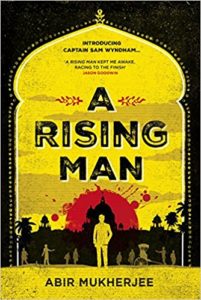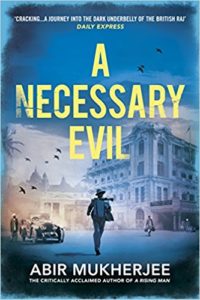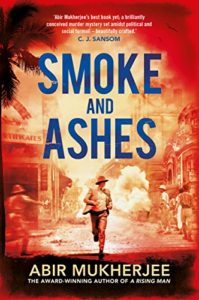Book Post 28: 18 February – 2 March 2019
At the beginning of the week I post some of the books I have received recently. In today’s Book Post 28 included are some of the titles I have received in the past few weeks.
3 March 2019
At the beginning of the week I post some of the books I have received recently. In today’s Book Post 28 included are some of the titles I have received in the past few weeks.
3 March 2019

























 Crime writer-cum-accountant Abir Mukherjee has written three novels — A Rising Man (2016), A Necessary Evil (2017), Smoke and Ashes (2018) . These novels feature opium addict Capt. Sam Wyndham, former Scotland Yard detective and a World War I veteran. Sam Wyndham is posted to Calcutta where his sidekick is a Bengali educated in England, Surendranath or “Surrender-not” Bannerjee as many refer to him. The three novels are set during the turbulent period of British India when the Independence movement was gaining strength. It is a challenging scenario for both police officers since the Englishman is viewed with suspicion to whatever crime scene he visits and the Indian is also receives a hostile reception for he is considered to be a traitor working with the colonial rulers. It is a fine balance the two investigating officers have to negotiate on a daily basis but they manage supremely well. It is also a
Crime writer-cum-accountant Abir Mukherjee has written three novels — A Rising Man (2016), A Necessary Evil (2017), Smoke and Ashes (2018) . These novels feature opium addict Capt. Sam Wyndham, former Scotland Yard detective and a World War I veteran. Sam Wyndham is posted to Calcutta where his sidekick is a Bengali educated in England, Surendranath or “Surrender-not” Bannerjee as many refer to him. The three novels are set during the turbulent period of British India when the Independence movement was gaining strength. It is a challenging scenario for both police officers since the Englishman is viewed with suspicion to whatever crime scene he visits and the Indian is also receives a hostile reception for he is considered to be a traitor working with the colonial rulers. It is a fine balance the two investigating officers have to negotiate on a daily basis but they manage supremely well. It is also a balance managed with aplomb by the author himself who is a British Asian and culturally identifies with both nations.
balance managed with aplomb by the author himself who is a British Asian and culturally identifies with both nations.
With every novel Abir Mukherjee’s confidence as a writer seems to grow. The stupendous opening lines of each novel are a testament to the fact. They hook the reader immediately.
At least he was well-dressed. Black tie, tux, the works. If you’re going to get yourself killed, you may as well look your best. ( A Rising Man)
It’s not often you see a man with a diamond in his beard. But when a prince runs out of space on his ears, fingers and clothes, I suppose the whiskers on his chin are as good as place as any. ( A Necessary Evil)
It’s not unusual to find a corpse in a funeral parlour. It’s just rare for them to walk in the door under their own steam. It was a riddle worth savouring, but I didn’t have the time, seeing as I was running for my life. ( Smoke and Ashes)
The characters are more alive and they come into their own with the subsequent novels — A Necessary Evil and Smoke and Ashes. Also Capt Wyndham and Surendranath Bannerjee understand each other better. Astonishingly they begin to share an apartment together which is wishful thinking on the part of the author as such a scenario would never have occurred in history — a British officer cohabiting with his Indian colleague. Nevertheless it makes for a nice little creative touch to the novels.
With A Rising Man there is always a very surprised and yet tentative tone to the writing style as if the author’s own astonishment at what he is achieved is apparent on every page. This is only discernible after having read all the other novels in quick succession. In fact the writing becomes pithier in every novel almost as if the skill of precision learned as an accountant has  enabled Abir Mukherjee to write fine crime novels. This is a genre of writing whose prerequisite is to have a keen eye for details, precise dialogue, and exacting descriptions without flabby sentences. In the case of historical fiction such as these novels fact checking also becomes critical.
enabled Abir Mukherjee to write fine crime novels. This is a genre of writing whose prerequisite is to have a keen eye for details, precise dialogue, and exacting descriptions without flabby sentences. In the case of historical fiction such as these novels fact checking also becomes critical.
Abir’s parents emigrated from Calcutta to Britain in the late 1960s. Abir was raised in Scotland and so it is no surprise when at the Edinburgh Festival he was introduced as a Scottish crime writer ( “Crime Writing: Val McDermid, Abir Mukherjee and Lucy Ribchester” in conversation with Mariella Frostrup. BBC Radio 4, Open Book, 1 Sept 2016). Approaching his fortieth birthday he was going through a mid-life crisis hoping there was more to life than accounting. It was then he chanced upon a TV breakfast show with acclaimed crime writer Lee Child. Abir Mukherjee immediately bought the first Jack Reacher book Killing Floor and was hooked. He says “I was amazed at how simply written and well plotted it was. I’d recently had an idea for a story centered on a British detective who travels to India after the First World War, and reading Killing Floor gave me the motivation to put pen to paper..” He had written about 10,000 words whenever he could spare the time from his day job when he chanced upon the newly announced Telegraph Harvill Secker Crime Writing Competition. This was 2013. He chose to send in the first 5,000 words of his incomplete manuscript and waited to hear. Three months later he did. He discovered that of over 400 applicants he had won the £5,000 competition and a publishing contract. He was very surprised as he writes in this Dead Good article ( April 2016) at having won . His debut, A Rising Man, won the CWA Endeavour Historical Dagger 2017 and was picked as one of Waterstones best books of 2017. Abir Mukherjee is now a part-time accountant as of January 2018 as he would like to devote more time to writing crime novels. ( Smokes and Ashes BBC Radio 4 interview with Samira Ahmed , June 2018) For the Harvill Secker crime writing competition 2018 he has been appointed as a mentor.
And yes, Capt. Sam Wyndham is a worthy creation, true to the spirit of Jack Reacher. Both the characters blossom with every passing novel; it is as if their creators become more comfortable living with the characters on a daily basis. (Listen to “In the Studio” by BBC World Service. In this episode Lee Child speaks of creating Jack Reacher.) The storytelling of Abir Mukherjee and Lee Child too becomes richer and tauter with every novel of the series. It will be curious to see how the Capt. Wyndham novels evolve. Will the Englishman stay on in Calcutta as the Independence movement intensifies? Or will the author choose to keep his detective like a fly caught in amber and spin out a number of stories set at a particular moment of history? For now it is impossible to say since the first three novels of this series are set in successive years — A Rising Man ( 1919), A Necessary Evil (1920), Smoke and Ashes ( 1921). Only time will tell. Perhaps with time too it may become clear if these books are optioned for film/television adaptations just as Arjun Raj Gaind‘s historical crime fiction novels set during British India have been optioned.
For now read these crackling historical fiction crime novels set during British India and you will not be disappointed!
Abir Mukherjee A Rising Man Harvill Secker, London, 2016, rpt 2017. Pb. pp. 390. Rs. 399
A Necessary Evil Harvill Secker, London, 2017, rpt 2018. Pb. pp.
Smoke and Ashes Harvill Secker, London, 2018. Pb. pp. Rs 599
14 June 2018
Reader
The sheer pleasure of immersing oneself in a book, flipping through its pages, dipping into it in parts, inhaling the heavenly smell of ink and freshly printed pages, stroking the cover to feel the design, are all part of the experience for me. It is fast becoming an equally thrilling adventure for my twenty-eight-month-old daughter, Sarah. She brings out her books and says, “Mummy padho.” What I find exhilarating is to see Sarah browse through the books that I owned as a child, to discover a fascinating new world. The spine of the book maybe falling apart, the pages have turned yellow and there are doodles done by me in pencil, years ago, but The Adventures of Winnie-the-Pooh continues to enchant Sarah, representative of a new generation of readers. These are tangible objects that she can touch, feel, flip the pages, trace the images and letters with her fingers, and crumple the pages…the first step to reading, recognising alphabets, words and creating a language and becoming a reader herself.
The modern reader, however, is faced with an over-abundance of choice. Today the market is flooded with books. There is a variety that is available to suit all reading sensibilities. Publishers are willing to experiment and develop lists, especially in the category of mass market fiction after the phenomenal (commercial) success of Chetan Bhagat, Advaita Kala or of Penguin’s Metro Reads. There is an abundance of fiction dealing with years spent in college or school like Arjun Rao’s Third Best or Amandeep Sandhu’s forthcoming novel, Roll of Honour. There is a wonderful variety in crime fiction ranging from Steig Larsson, Yrsa Sigurðardóttir, Lee Child, Madhulika Liddle, Andrew Lane, and Jo Nesbo to name a few. For a niche genre like historical fiction, Indian fiction in English is spoilt for riches with Indu Sundaresan’s Taj Trilogy, Chitra Bannerjee Divakurni’s Victory Song, Greta Rana’s Rana Women of Nepal, Alex Rutherford’s Empire of the Mughal series and an old one (but a classic) of Kiran Nagarkar’s Cuckold.
There are finer distinctions like chick-lit and narrative non-fiction that are doing well, but it does beg to ask the question, what is the profile of the reader of [for?] this literature. Who is this person/s? Who is buying these books? In spite of experimentation, publishers are careful of their bottom line and do not necessarily publish all that comes their way. Yet the examples cited illustrate that professional editors still have a good sense of the kind of books that will sell.
The other solution is to reach out to readers, make them part of the process. The internet and the blogosphere provide a range of opinions and at times provide a platform for literary tastemakers [who] to inform and shape the discourse. It is especially important for publishers to continually create a new generation of readers. It happens by creating targeted marketing campaigns, fostering and nurturing literary spaces. Literary soirees and book-launch parties are fashionable, but an engagement with the readers is a long term relationship. These could start early (as is happening with Sarah) or via book clubs, literary societies in institutions, or even literary festivals. The presence of efficient online book retailers that ensure an order gets shipped anywhere, anytime and at a reasonable cost to a customer, will only strengthen the reading environment. Today, with books available in a variety of formats, makes the profile of a reader even more difficult to ascertain. Yet, it is an exciting challenge for publishers. Anil Menon, author of The Beast with Nine Billion Feet says “reading might (in future) be a social act. A print book enforces a solitary experience. But I’ve noticed that when I’m reading on the Kindle, I can access other people’s comments if I feel like it. The solitary reader may be a thing of the past. Books written to facilitate social reading might be different from books written for the solitary reader. Children’s books– very young children– are already designed to be read by parents and children together. I can imagine books for teens written to be enjoyed in a group.” All these factors can only add up to the growing significance of the reader, who forms the market.
Jaya Bhattacharji Rose is an international publishing consultant.
(p.58, Books and More, June-July 2012)
